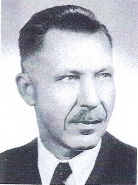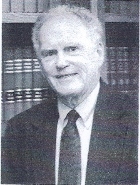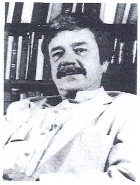Hall of Fame Inductees
See our latest inductees listed below! Click on any inductee's name to learn more.
We apologize for the poor quality of some older inductee photographs. We are working to correct this as soon as possible.
Interested in submitting a nomination? Please click here to learn how »


George Peter Murdock (Science/Medicine)
1897 – 1985
George Peter Murdock, internationally renowned anthropologist, was born on his parents' farm in East Meriden on May 11, 1897. His early education was in a one-room school near his home, followed by Phillips Academy in Andover and Yale University. After receiving his A.B. and Ph.D. from Yale, he spent most of his teaching career at Yale. In 1960 he went to the University of Pittsburgh as the Andrew W. Mellow Professor of Anthropology. He was the founder of the Society for Applied Anthropology, and was its president in 1947. He also served as president of the American Ethnological Society and of the American Anthropology Association. Murdock's scholarly contributions to anthropology were in the systematics of crosscultural and comparative study. Three major works resulted: Social Structure (1949), Africa (1959), and Theories of Illness (1981). With his colleagues at the University of Pittsburgh, he founded the journal Ethnology. His last work, Atlas of World Cultures, was published in 1981. In addition to many awards, Viking Fund Award (1949), Herbert E. Gregary Medal (1966), Wilbur Lucius Cross Medal (1967), and Thomas H. Huxley Medal (1971), he was elected to membership in the American Academy of Arts and Sciences, and the National Academy of Sciences. Murdock's colleagues remember him as a prodigious worker, a superior writer, a diligent lecturer, and a mentor. His long career spanned the coming of the Age of American Anthropology, playing an important leading role in its growth and development.


Judge Donald T. Dorsey (Law/Government/Military)
1923 – 1999
Judge Dorsey was born in Meriden, the son of Patrick and Theresa Dorsey. He attended St. Rose School, Jefferson Junior High School, and Meriden High School, from which he graduated in 1941. After serving in United States Air Force from 1943-46, he entered Yale University. Dorsey received his B.A. from Yale in 1949 and then went on to the University of Connecticut School of Law. After graduation in 1952, he became a member of the Connecticut Bar Association. Currently he is a member of the Connecticut Bar Association and the American Judicature Society. Before his appointment to the Connecticut Judiciary in 1972, Dorsey practiced law and served the City of Meriden as the Meriden Housing Authority Counsel in 1960 - 1961. He was named Corporation Counsel for Meriden in 1962 and was elected mayor in 1967 and in 1969. He resigned as mayor in 1971 to take an appointment as State Commissioner of Community Affairs. In 1972 he was appointed to the Circuit Court of Connecticut. Having reached mandatory retirement age, Dorsey will continue to serve in the Superior Court as a trial referee. A lifelong resident of Meriden, Judge Dorsey has given much of his spare time to serving on boards such as the Boys' Club, the American Red Cross, the Meriden Symphony, the Curtis Home, the Rosa Ponselle Fund. He was recently elected to the Boys' Club Hall of Fame. During his tenure as mayor, he proposed building programs which were initiated during his term as mayor, including: a new elementary school, Casimir Pulaski; additions to Maloney and Platt High Schools; the housing for the elderly at Community Towers; the new municipal library; the mid-town parking lot: the dog pound on East Road; the acquisition of land for Falcon Field and the city's self-insurance program, which he initiated as Corporation Counsel in 1962. As a judge, his most complicated case was the one which arose as a result of the collapse of the Hartford Civic Center on January 18, 1978. Approximately 50 separate lawsuits were filed which were consolidated for a jury trial before Judge Dorsey. Judge Dorsey was an active trial judge for twenty-one years serving successfully in the Circuit Court, the Court of Common Pleas and the Superior Court. The father of six children, he resides with his wife, the former Katherine Gaffey, in Meriden, Connecticut.


Lewis Turco (Literature)
1934 – 2024
Lewis Turco was born in 1934 in Buffalo, New York, and he grew up in Meriden, Connecticut. He graduated from Meriden High School in 1952 and served in the U.S. Navy from 1952-56. Subsequently he took his BA and M.A. degrees from the Universities of Connecticut and Iowa. In 1962 he founded the Cleveland State University Poetry Center. In 1968, he founded the Program in Writing Arts at the State University of New York (S.U.N.Y.) at Oswego, and has directed it for 25 years. Professor Turco's fiction, poems, essays, plays, critiques and memoirs have appeared in The Atlantic, The New Yorker, Newsday Magazine, The Nation, The New Republic, Yankee, and in over 100 anthologies and editions. Among his many books, Awaken Bells Falling: Poems 1959-1967 and The Book of Forms appeared in 1968. The New Book of Forms and Visions and Revisions of Ameriam Poetry were published in 1986, the latter winning the Melville Cane Award of the Poetry Society of America. The Fog: A Chamber Opera, written with the Dutch composer Walter Hekster, was published in Holland in 1987. The Shining Web: New and Selected Poems and Dialogue were published
in 1989. A British edition of the latter appeared in 1991, and II Dialogo, an Italian edition, in 1992. His most recent book, Emily Dickinson: Woman of Letters appeared in 1993. Appointed by the Chancellor of S.U.N.Y. to lifetime tenure as a Faculty Exchange Scholar in 1975, he has been a visiting Professor of English at S.U.N.Y. College at Potsdam (1968-69), Bingham Poet-in-Residence at Ashland University (1991), where he delivered a series of addresses published in 1991 as The Public Poet: Five Lectures on the Art and Craft of Poetry. In 1992 he was appointed by the New York Council for the Humanities to its Speakers Bureau, and the University of Connecticut recognized him with a Distinguished Alumnus Award.



